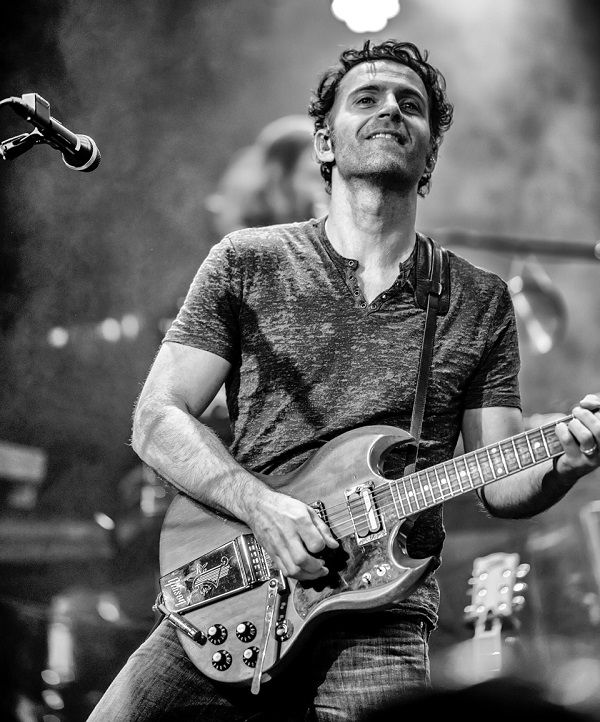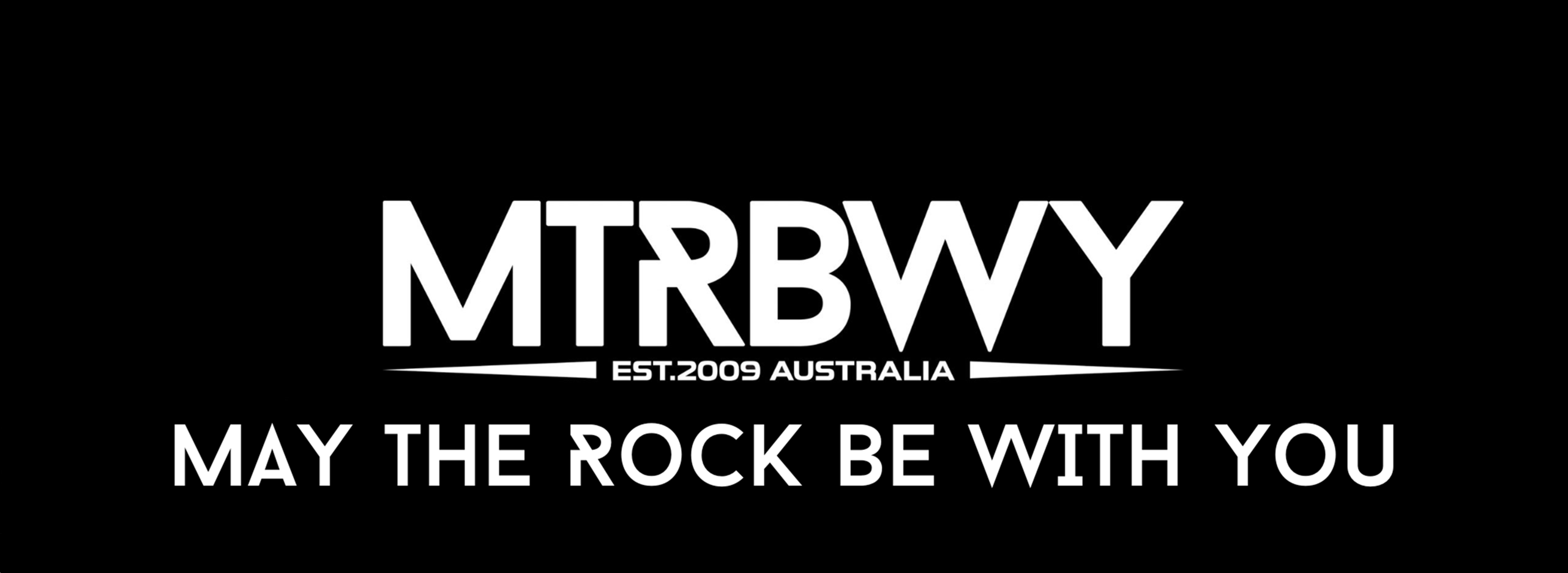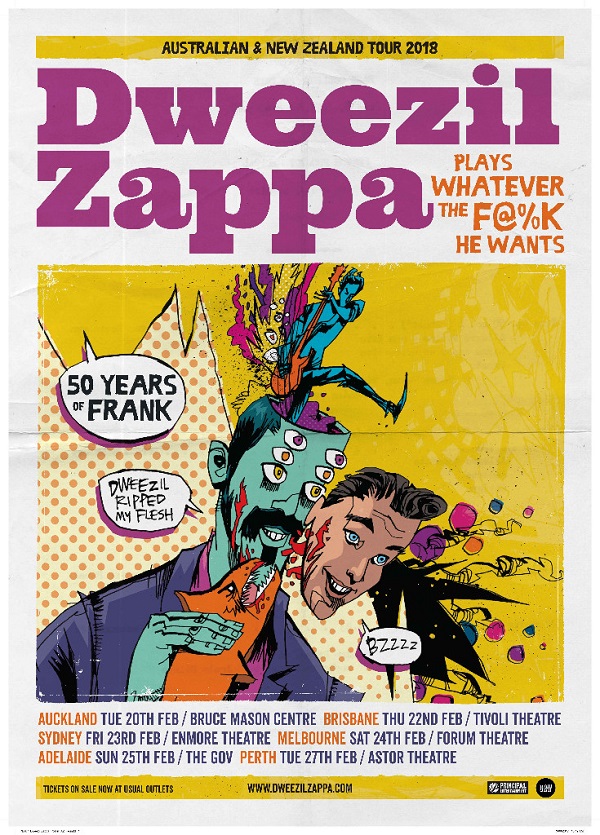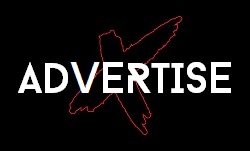 “…we’ve definitely put material together that shows off a lot more in depth elements of my Dad’s composing style and I think if anyone has not heard the music they’ll get a very broad selection which I think has always been my goal is to show as much of the depth and variety and composition style, and so that’s kind of the way we view the fifty years of music…”
“…we’ve definitely put material together that shows off a lot more in depth elements of my Dad’s composing style and I think if anyone has not heard the music they’ll get a very broad selection which I think has always been my goal is to show as much of the depth and variety and composition style, and so that’s kind of the way we view the fifty years of music…”
From Release: Dweezil Zappa, son of the legendary Frank Zappa is celebrating 50 years of Zappa with a series of concerts and exclusive guitar masterclasses in Australia & New Zealand in early 2018. Sheik Yerbouti this February, 2018 as the legendary music of Frank Zappa is celebrated live on stage by the man’s prodigiously talented son Dweezil Zappa and his band The Others of Intention. Dweezil will be whippin’ up a G-Spot Tornado, as he explores everything from the deepest album cuts through to the cult favourites that have made Frank Zappa and his music such an indelible influence on our musical culture.
Dweezil Zappa gave us a call while in Los Angeles to talk about the upcoming Australian tour, his Dad’s music, masterclasses, advice, balance, and more.
You’re heading back to Australia to see us and celebrating fifty years of Zappa, what can people expect at these upcoming shows?
Well the music selection is very broad by comparison to some other tours that we’ve done, we’ve created the show to be more of the feel of a sort of like a chronological visit through my Dad’s music, so rather than play all the material from any particular album we focus on some of the early Mothers of Invention stuff in the front part of the show so maybe the first thirty five or forty minutes of the show is early Mother stuff and then it starts to continue chronologically into other eras, but we’ve definitely put material together that shows off a lot more in depth elements of my Dad’s composing style and I think if anyone has not heard the music they’ll get a very broad selection which I think has always been my goal is to show as much of the depth and variety and composition style, and so that’s kind of the way we view the fifty years of music and I guess also we do focus on some stuff from ‘Freak Out’ since that was his first album.
What is it like for you looking back over your Dad’s career and performing the music he created over such an extensive catalogue?
Well for me I’m always amazed at his ability to vary from song to song and from album to album, as a composer, as a guitarist, as an arranger he didn’t have any particular patterns or things that he would do and repeat all the time, a lot of people will fall into that they’ll find one thing that they have and it becomes a so called signature sound or whatever, but if you go from album to album there’s so much depth and variety that it’s kind of awe inspiring really to see that he was able to do that. Especially when you think of western music only has twelve tones that you can use and you have to keep rearranging those in different orders with different rhythms and he just seems like he had a whole other bag of notes that nobody else had *laughs*.
So is there one song that just slays you every time you play it and that stands out as an absolute favourite?
There’s songs that are fun to play, songs that are challenging and they have different things that you are sort of required to accomplish and there’s a few that put all of those elements together and one of those is ‘Inca Roads’ it has these very difficult parts that you have to play the composed elements then it has a lot of improvisational elements which require a totally different thought process and sensitivity. There’s a little bit of humour to it as well so it has kind of like every ingredient that you could ever put into it and there’s a few songs with a similar recipe to that but they don’t sound at all alike, but that one has kind of been in our repertoire from the very beginning and rarely do we have a show where it isn’t in the set list or it isn’t requested. So it’s kind of a fan favourite and it’s great fun and a challenge to play and as many times as we’ve played it it never gets any easier that’s the other thing about it, if we’ve done say between fifty and a hundred shows for the past eleven years and virtually played that at every concert you’d think we’d have that one to where you could play it in your sleep but you’ll never find that with Frank’s music it always keeps you on your toes.
As well as the shows you’re also doing some masterclasses prior to each show, what’s involved in there?
Well a lot of people have asked me over the years how did you go about learning your Dad’s music and you seem to have changed your style of play so drastically and what was it that you had to do to change your playing and in doing all those changes to my own playing I did find that there were a few key elements that helped me make speedy improvements and gave me more fun and excitement in playing. So I tried to distil those things into its simplest form so that anybody who has just begun playing or if they’ve been playing for twenty years they’re going to find some of these things will be very, very useful in implementing right away and making it so that you can kind of double or almost triple your vocabulary overnight. The reason that’s possible is that there’s this simple trick to looking at the guitar neck and diving the guitar into three sets of two strings that suddenly reorganises your brains ability to connect ideas and see and use the guitar neck, so it’s one of these things that if you’ve been playing forever you may not have looked at it this way and it’s a real eye opener, you look at it and you go wait a minute now I totally see a whole network or a whole highway of places to play whereas before I got stuck in these three little boxes now you can connect everything and you have this freedom to move around, so it really gives you a really lateral highway way to connect everything instead of these sort of vertical boxes that people find themselves stuck in.
So it’s kind of hard to explain in words but very quick and easy to demonstrate in the classes, so in an hour or ninety minutes I can present a simple little concept that could blow up anybody’s vocabulary and give them lots more fun ways to practise. I’ve been doing it for a few years so I know that it gets great results for people, it’s quite often the same exact reaction, like oh my god all these years I’ve been playing, or I just started playing and I was hoping for something like that. It’s a really simple, simple thing and the funny thing is that I taught myself to play guitar one string at a time as a kid and I suddenly realised that there were only five shapes that your fingers would go into for the pentatonic scale and the pentatonic scale is the most widely used scale and everybody plays it and it just sounds good on guitar, but there’s really only five variations of where you would put your fingers to play through the entire scale, and if you do those same shapes on each set of two strings and you divide by the octave, so if you know where your octaves are and you know you’re starting on the shapes actually never change its just where they start, one might start on the third fret, one might start on the fifth one might start on the seventh. When I show people this and they start seeing it and they can suddenly do three octaves with one idea it starts sounding like a an extended idea and people love being able to automatically get that freedom and see that right away.
Being around music you’re whole life is there one piece of advice you were given when you started playing music that you’ve maintained and has stuck with you throughout the years that you still go back to to this day?
I think really the best piece of advice is that if it sounds good to you then it’s good. So sometimes people get concerned what they’re doing might not make sense to somebody else and they may take less risks, like oh this doesn’t sound right then some people might be like oh this sounds crazy and they go for it you know? The point really is that you need to use your own compass and figure out why you like the sound of something and once you figure out what it’s made out of you can use it more effectively. Overall it’s about enjoying the creative process and making something memorable, making something connect with people and sometimes it takes a long time to develop what your personal style is, some people get it early on and some people just take a while before they can distil enough of the information and try to see well I gravitate towards these sounds, these are the things that I like and these are the things I’m gonna focus on. Overall just enjoy the creative process and if it sounds good to you then that’s the whole reason that you should be doing it.
In terms of new music it’s been a couple of years since your last solo album, how do you balance your musical output against being out there playing your Dads?
It’s been a challenge and one of the biggest reasons I haven’t been able to do that much of my own music for a while is I haven’t had a place to work from that in between tours and things that I could really set up shop and that creative space and have the time to do it, so for me over the last couple of years I’ve been trying to figure out a way where I can actually have a space to do it where it’s not gonna be something I constantly have to work up a budget for just to be able to go in and record and stuff like that, that can be a hindrance for anyone like oh I’d love to do something but it costs me a bunch of money to do it so I’m gonna have to wait *laughs*. Ultimately the other side of it is there’s a challenge between balancing doing sixty, eighty, a hundred shows a year and the amount of time to actually physically do that is about five or six months of the year, so the rest of the time of the year I’d like to be able to spend time with my wife and kids and do some other things, that’s really the biggest challenge is finding the balance of spending enough time when I’m also away quite a bit.
Lastly let’s look ahead to the future, finish this sentence for me, in 2018 Dweezil Zappa will…
I will release a lot more new music including some orchestral music I was recently asked to write for a Dutch orchestra, a hundred piece orchestra, and so hopefully it will actually come out in 2018. It’s one of those things that I never really thought I would be doing I mean it’s something I always appreciated my Dad did and could do but when it came to me doing it I don’t have the training that he did , he was self-taught and went to the library and learned how to do it all himself. I learned to use a computer to do a lot of things to help with the notation and all that stuff that I’m not handy with just pen and paper like my dad. So it took a while over the past decade to learn more about all the things that are possible with writing for an ensemble or an orchestra and I think just by playing my Dad’s music I was able to learn enough to be able to do that, but when you consider writing for a hundred musicians that’s an army basically, so it’s gonna be quite interesting to see how it all comes together.
DRW ENTERTAINMENT IN COLLABORATION WITH PRINCIPAL ENTERTAINMENT PRESENT
DWEEZIL ZAPPA – CELEBRATING 50 YEARS OF FRANK
TUESDAY 20TH FEBRUARY AUCKLAND BRUCE MASON CENTRE
THURSDAY 22ND FEBRUARY BRISBANE TIVOLI THEATRE
FRIDAY 23RD FEBRUARY SYDNEY ENMORE THEATRE
SATURDAY 24TH FEBRUARY MELBOURNE FORUM THEATRE
SUNDAY 25TH FEBRUARY ADELAIDE THE GOV
TUESDAY 27TH FEBRUARY PERTH ASTOR THEATRE
For tickets visit:
http://davidroywilliams.com/tours/dweezil-zappa/
Essential Information
From: Los Angeles, CA, USA
Website: www.dweezilzappa.com



